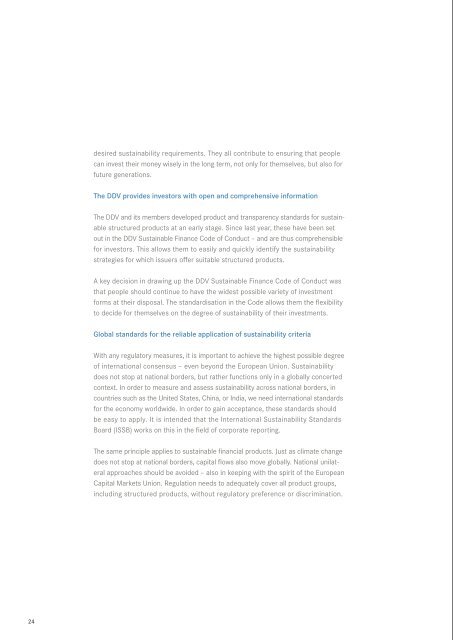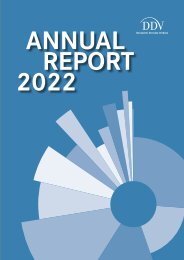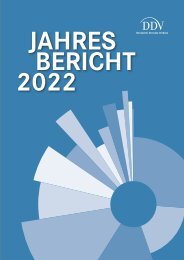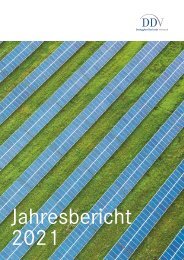DDV Annual Report 2021
Create successful ePaper yourself
Turn your PDF publications into a flip-book with our unique Google optimized e-Paper software.
Efficient coordination<br />
for competitive<br />
EU financial markets<br />
desired sustainability requirements. They all contribute to ensuring that people<br />
can invest their money wisely in the long term, not only for themselves, but also for<br />
future generations.<br />
Improving financial market supervision for<br />
pensions and securities<br />
The <strong>DDV</strong> provides investors with open and comprehensive information<br />
The <strong>DDV</strong> and its members developed product and transparency standards for sustainable<br />
structured products at an early stage. Since last year, these have been set<br />
out in the <strong>DDV</strong> Sustainable Finance Code of Conduct – and are thus comprehensible<br />
for investors. This allows them to easily and quickly identify the sustainability<br />
strategies for which issuers offer suitable structured products.<br />
A key decision in drawing up the <strong>DDV</strong> Sustainable Finance Code of Conduct was<br />
that people should continue to have the widest possible variety of investment<br />
forms at their disposal. The standardisation in the Code allows them the flexibility<br />
to decide for themselves on the degree of sustainability of their investments.<br />
Global standards for the reliable application of sustainability criteria<br />
With any regulatory measures, it is important to achieve the highest possible degree<br />
of international consensus – even beyond the European Union. Sustainability<br />
does not stop at national borders, but rather functions only in a globally concerted<br />
context. In order to measure and assess sustainability across national borders, in<br />
countries such as the United States, China, or India, we need international standards<br />
for the economy worldwide. In order to gain acceptance, these standards should<br />
be easy to apply. It is intended that the International Sustainability Standards<br />
Board (ISSB) works on this in the field of corporate reporting.<br />
The same principle applies to sustainable financial products. Just as climate change<br />
does not stop at national borders, capital flows also move globally. National unilateral<br />
approaches should be avoided – also in keeping with the spirit of the European<br />
Capital Markets Union. Regulation needs to adequately cover all product groups,<br />
including structured products, without regulatory preference or discrimination.<br />
EU financial market supervision for banks (EBA),<br />
securities and markets (ESMA), and insurance<br />
(EIOPA) is crucial for the resilience and efficiency<br />
of the financial system. Its performance should<br />
therefore be reviewed and adapted on an ongoing<br />
basis – this was outlined in the action plan for<br />
the Capital Markets Union. On this basis, the<br />
EU Commission has launched a consultation on<br />
supervisory convergence and the single rulebook.<br />
The <strong>DDV</strong> participated in this consultation, calling<br />
for essentially three improvements that serve the<br />
competitiveness of the EU Capital Markets Union:<br />
1) Integrating competitiveness and attractiveness<br />
into the ESA mandate<br />
Only competitive EU capital markets can make<br />
capital available for European firms and create<br />
stability. This is why the authorities should now<br />
send a clear signal – with regulation and supervision<br />
that support strong and efficient financial<br />
markets. The attractiveness of the U.S. financial<br />
market is already part of the mission of the U.S.<br />
Commodity Futures Trading Commission (CFTC).<br />
In the United Kingdom, an expansion of the mandate<br />
of the Financial Conduct Authority (FCA) is<br />
under discussion. This makes an expansion of the<br />
mandate of the supervisory authorities to include<br />
the competitiveness and attractiveness of the EU<br />
financial system all the more relevant.<br />
2) Improving coordination and convergence –<br />
especially between ESMA and EIOPA<br />
ESMA and EIOPA focus on products that serve a<br />
similar purpose – financial security. As such, it<br />
makes sense to strive to reduce cross-sectoral<br />
supervisory differences. Accordingly, ways<br />
should be found to strengthen the existing activities<br />
of the Joint Committee of the ESAs, for example,<br />
through sharing databases, procedures, and data<br />
collection.<br />
3) Making the most of the Q&As<br />
The Q&As are a very helpful instrument of supervision.<br />
Although they are not legally binding,<br />
they nevertheless provide market participants<br />
with important information and lead to greater<br />
consistency in market practices within the EU.<br />
This instrument, however, has not yet been fully<br />
utilised. As such, the <strong>DDV</strong> is calling for the relevant<br />
stakeholders in the financial industry to be<br />
consulted – at least in the case of Q&As that<br />
have a material impact on the operations or compliance<br />
of market participants.<br />
24 25








